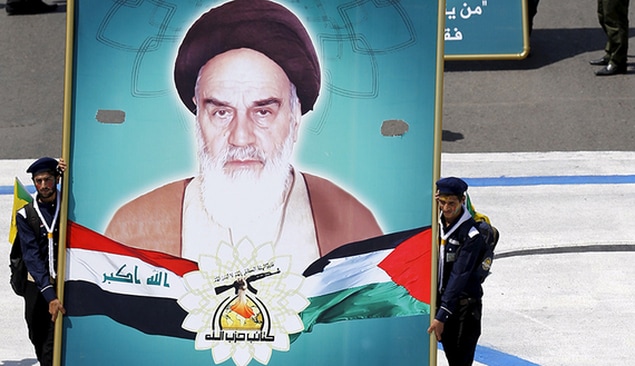
The local government in the holy city of Najaf had renamed a street after him in April 2015. The change in Basra, made July 1, sparked controversy and debate on social media because it was done outside legal and administrative procedures.
The PMU's apparent usurpation of this power of local authorities and other actions have sparked debate on social media and elsewhere about what this might mean for the future in terms of the PMU's political ambitions and quest for power.
Taleb Abdel Aziz, a journalist from Basra, and Sattar Awad, a professor of philosophy at the Al-Mustansiriya University in Baghdad, expressed concern to Al-Monitor about the implications of the PMU's assertiveness on Iraqis' rights down the road. PMU spokesperson Karim al-Nuri told Al-Monitor that having political ambition is a legitimate goal for PMU militias given their defense of Iraq against the Islamic State (IS).
The PMU has apparently been increasingly trying to impose its authority and ideology in Basra and other predominantly Shiite areas in the south. Taleb Abdulaziz, a well-known poet and media figure from Basra, told Al-Monitor that the organization has in some instances prohibited the sale and purchase of alcoholic beverages and certain haircuts considered Western. It has also been raising Shiite flags and its symbols on public institutions.
Abdulaziz said that many people fear discussing PMU-related issues in Basra. “We cannot talk, because the security situation is out of control. Anyone can receive death threats from armed groups affiliated with militias in the PMU,” he said. “The street name change, restriction of freedoms, and widespread Iranian flags and pictures of Iranian leaders are examples of PMU dominance in the public sphere in Basra.” As some of the PMU militias are controlled or influenced by Iran, there are concerns about the PMU growing in political power and in some ways possibly subordinating the authority of the Iraqi state to Iran.
“Most of the PMU factions did not pledge allegiance to Iraq,” Awad told Al-Monitor. “They prioritize Iran’s interest over Iraq in any conflict in the region and the world.” As an example, the People's Mojahedin Organization of Iran often accuse pro-Iranian PMU militias of shelling Camp Liberty, where its leaders and other members are housed, as occurred on July 4 when the camp was hit by dozens of rocket-propelled grenades. The Iraqi government has no interest in targeting the Iranian opposition group.
The PMU also often expresses hostility toward the United States and Saudi Arabia in sync with Iran. Recently some of the PMU factions in Basra desecrated a US flag and a picture of Saudi King Salman bin Abdul-Aziz Al Saud at an event on Al-Quds Day, which Khomeini had declared to be held the last Friday of Ramadan. Hostility toward the United States is, however, a contentious issue among the PMU. “It was not right to desecrate the US flag,” Nuri said. “Had it not been for the US, no one would have been able to hold the event in the first place. Such behavior entails recklessness, carelessness and ignorance.”
Militias in the PMU have not hidden their desire to assume political roles and gain power. “It is not right to abandon the political action and stay in the barracks after having engaged in fighting,” said Nuri. “The PMU military involvement does not prevent them from having political ambitions.”
The ambitions of some miliitas are likely encouraged by the decreasing legitimacy of those currently in power because of widespread corruption and the government's inability to function properly. This has led to popular anger, which could be to the PMU militias' advantage, especially when coupled with their recent growth in popularity following its participation in retaking Fallujah from IS.
A number of the PMU militias, Asayeb Ahlualhaq being one example, have established parties so they can enter the political arena. In other cases, the militias had formerly been affiliated with a political party but had been disbanded only to regroup after the call by Grand Ayatollah Ali al-Sistani for Iraqis to rise up against IS. Muqtada al-Sadr's Peace Brigades fall under this category.
The prospect of the militias in government is not an appealing prospect to some observers. “The PMU do not have any administrative competence to run the country or govern the people. Their knowledge is limited to wars, fighting and the implementation of Sharia, just like religious parties in Iran,” said Awad. It seems the PMU do not differ so much from the political forces currently in power.
Source www.al-monitor.com/pulse/originals/2016/07/basra-pmu-khomeini-iraq-iran.html

 RSS Feed
RSS Feed